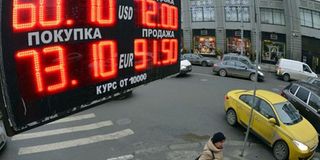Despite cheap oil, ruble fall creates big turbulence for Russian airlines

A woman walks under a board listing foreign currency rates against the Russian ruble outside an exchange office in central Moscow, on December 17, 2014. PHOTO | YURI KADOBNOV |
What you need to know:
- Currency tumble hurts firms who pay expenses using foreign money
- According to Deutsche Bank, Russia’s leading airline Aeroflot earns 90 per cent of its revenue in rubles while 60 per cent of its costs are in foreign currencies.
MOSCOW, Sunday
Their international competitors may be cheering tumbling oil prices, but the collapse in the ruble has meant major financial turbulence for Russian airlines who have expenses in foreign currencies.
The ruble has slumped by 40 per cent this year against the dollar and euro, mostly due to crude oil prices falling by half in the past six months as Russia’s economy is heavily dependent upon oil exports.
As jet fuel accounts for upwards of a quarter of the cost for flights, most airlines are set to see a boost to earnings.
Russian airlines also stand to benefit, but that is expected to pale in comparison to the double whammy resulting from the drop in the value of the ruble.
First, traffic on their most profitable international routes has dropped as Russians stopped travelling as their purchasing power has been eroded, not to mention ticket prices being jerked up twice by 10 per cent.
Second, the airlines have considerable costs in foreign currencies — mostly aircraft leases — which have nearly doubled in ruble terms as the currency has slumped.
FOREIGN CURRENCIES
According to Deutsche Bank, Russia’s leading airline Aeroflot earns 90 per cent of its revenue in rubles while 60 per cent of its costs are in foreign currencies.
“The situation is very serious,” said Oleg Panteleyev, the editor-in-chief of the specialist website AviaPort.
“The result is obvious: as a drop in traffic is inevitable, they must return planes to lessors, reduce foreign currency costs and lower the number of planes and flights,” he told AFP.
With traffic rising by 15 to 20 per cent annually in recent years, Russian airlines have leased and ordered new planes from Airbus and Boeing to retire their ageing fleet of gas-guzzling Russian aircraft.
Uncertainty has hovered for weeks over the third-largest Russian airline, Utair. Unable to repay some of its debts, Alfa Bank has been trying in court to seize its aircraft.
Then this past week doubts began to surface about the finances of number two airline Transaero, which boasts a fleet of more than 100 mostly Boeing aircraft.
TASS news agency reported that it had appealed to the government for help to avoid having to suspend flights. Even if Transaero denounced the report as an attempt to destabilise it by competitors, the possibility of thousands of Russian tourists stranded abroad as happened this past summer when a number of travel agencies went bust, was enough to prod the government into quick action.





